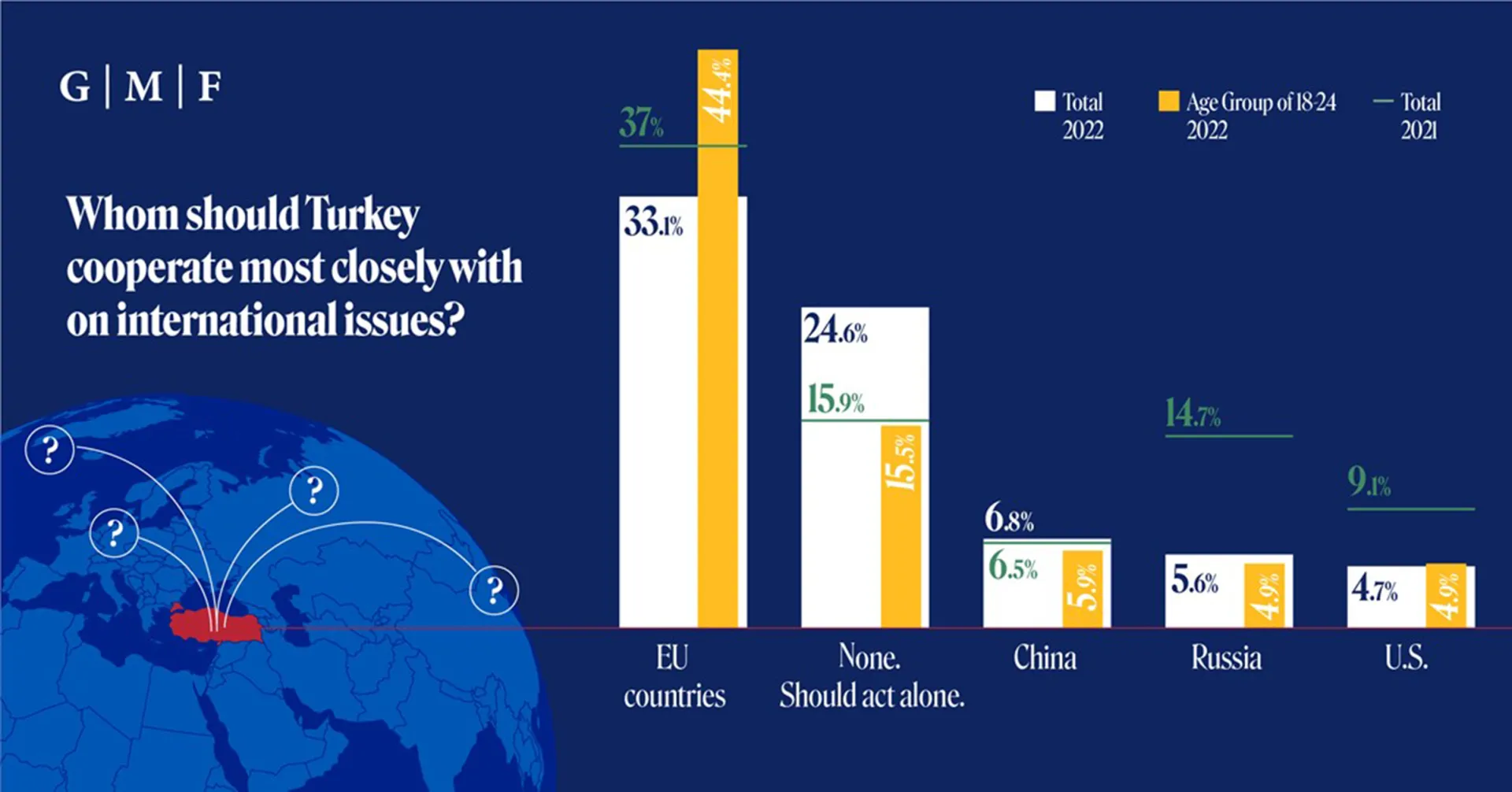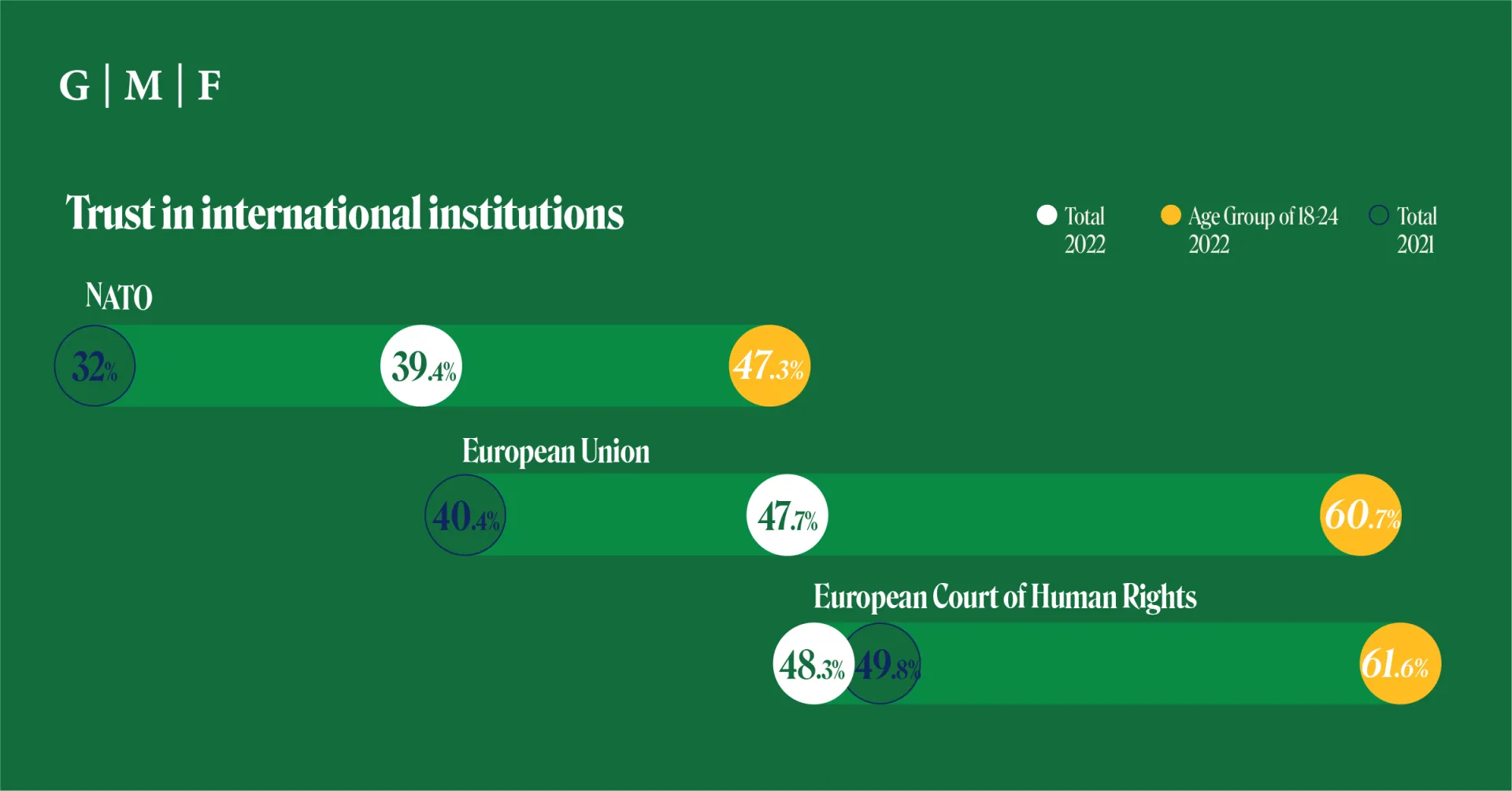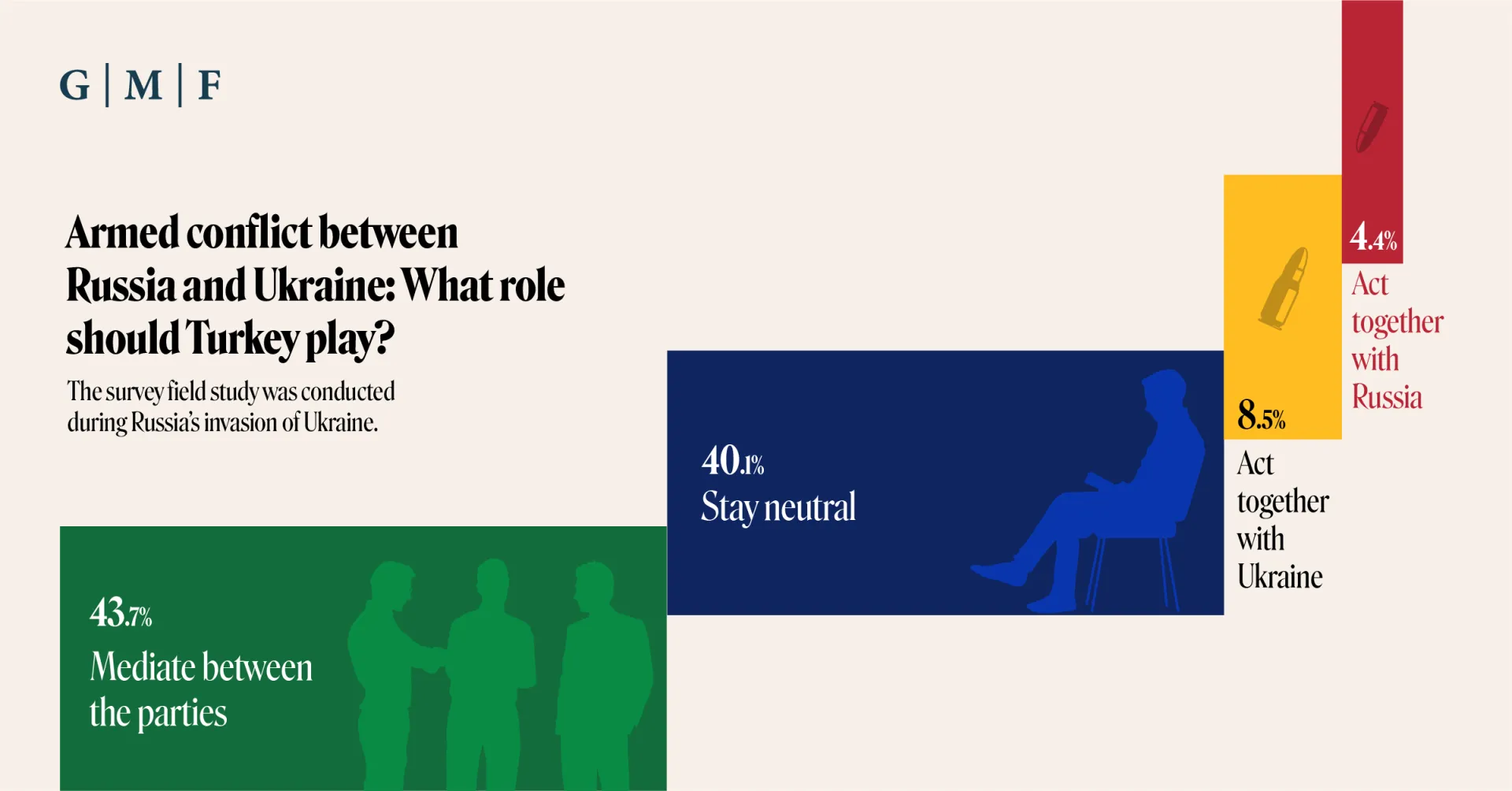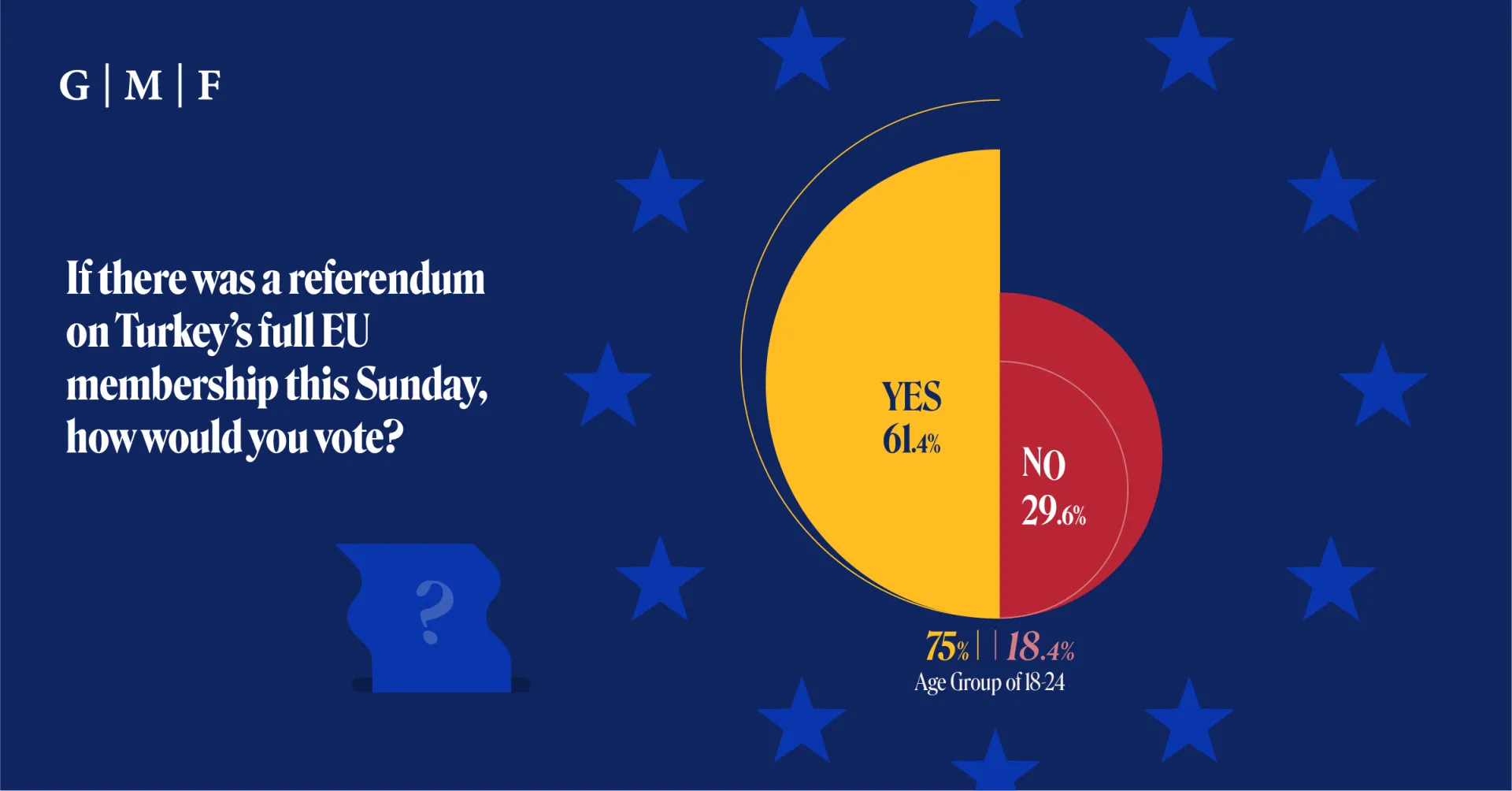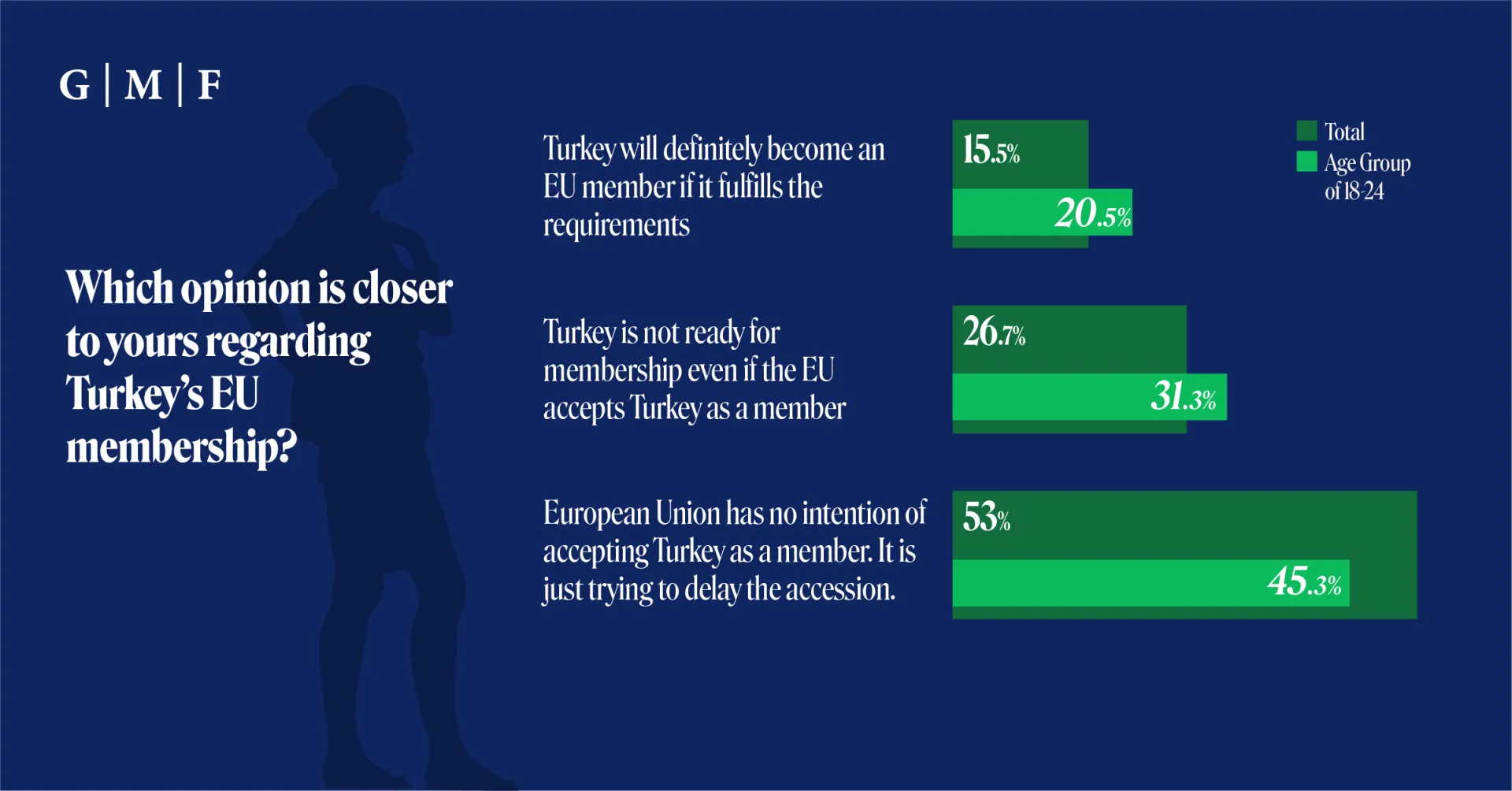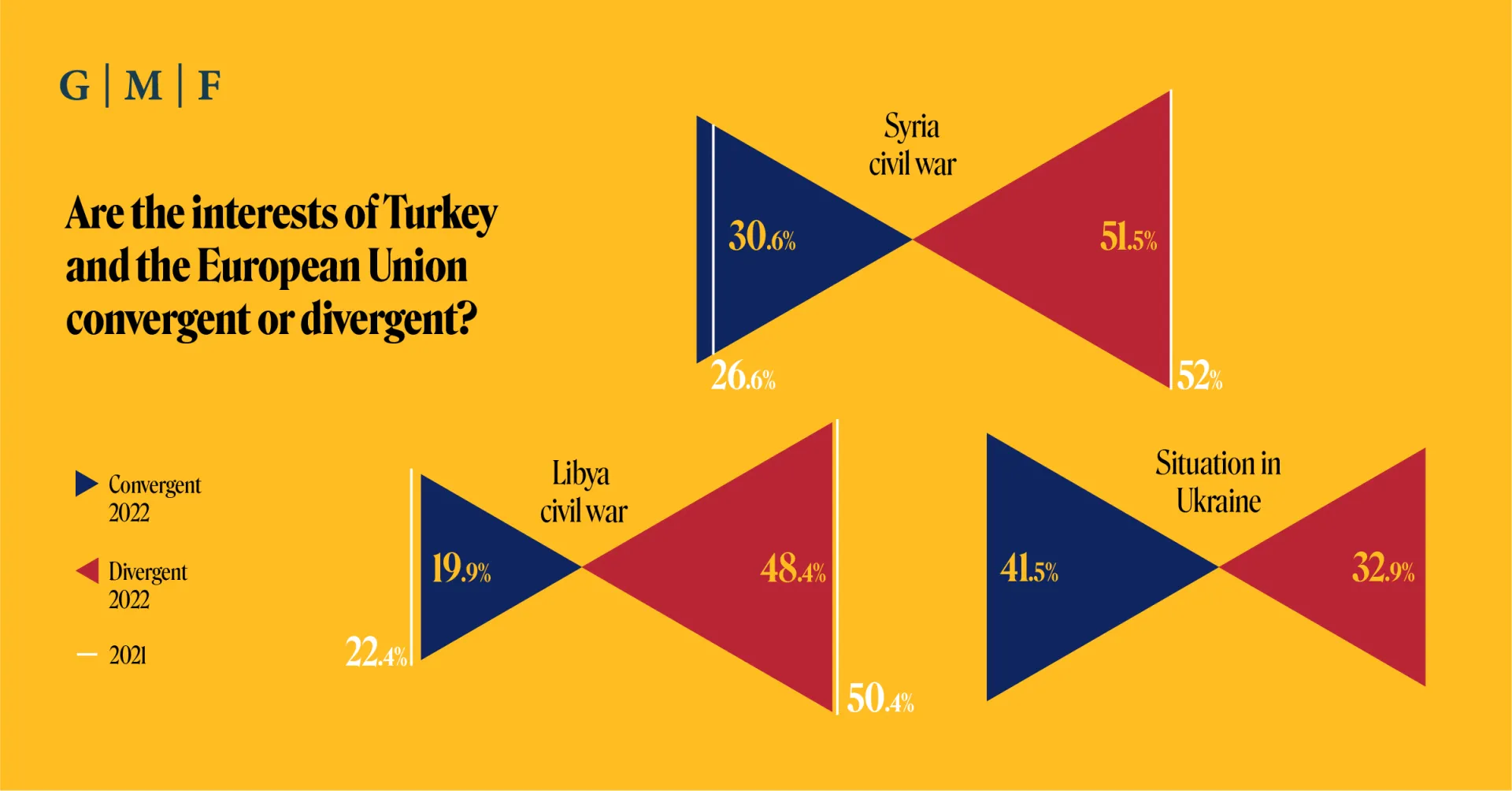Turkish Perceptions of the European Union 2022
The survey was carried out in 27 Turkish provinces between March 2 and 26, 2022 by means of face-to-face interviews, with 2,180 respondents representing Turkey’s adult population.
Turkey-EU relations have been marked by political crises. As a result, Turkey’s EU accession process has more or less been put on the back burner. However, since the tensions in the Eastern Mediterranean began to decline in Autumn 2020, several high-level dialogue meetings have taken place between the two sides and relations have started to ease. Nevertheless, establishing a stable relationship and a positive agenda has yet to be achieved.
Similarly, after years of tension between the United States and Turkey, the relationship has struck a more positive tone over the last year, particularly since the United States' withdrawal from Afghanistan. While high level political dialogue is still lacking, there has been close dialogue on bureaucratic level.
While not one of the key drivers, public opinion has increasingly become an important factor impacting foreign policy in democratic countries. The field study of this year’s survey was conducted during Russia’s invasion of Ukraine, making the results even more interesting.
Within this framework, we hope that this survey will provide a valuable resource for policymakers, media, think tanks, and academics who are searching for ways to put the EU-Turkey or EU-Western relationship back on track.
SURVEY LAUNCH EVENT: Turkish Perceptions of the European Union 2022
While not one of the key drivers, public opinion has increasingly become an important factor impacting foreign policy. The Turkish Perceptions of the European Union survey aims to reflect on Turkish public opinion toward the European Union, Turkey’s EU accession process, the reform process, and Turkish foreign policy in general. The field study of this year’s survey was conducted during Russia’s invasion of Ukraine, making the results even more important.
Key Findings of the Survey
Foreign Policy
Turkey’s public opinion seems to favor the European Union as the closest partner in dealing with international matters. The survey demonstrated people believe the EU's effectiveness for solving global problems compared to other countries or group of countries would lead to better results for humanity. However, this opinion is more pronounced in the 18–24 age group compared to the general population.
The Russian invasion of Ukraine has had a negative impact on how the Turkish perceive Russia. After the invasion, Turkish citizens have been less likely to perceive Russia as a partner and more likely to see it as a security threat.
The tendency to act alone has significantly increased in Turkey. Roughly one quarter of the public thinks that Turkey should not cooperate with anyone on international issues.
- When asked about Turkey's two most important partner countries, 47.2% of the respondents mentioned Azerbaijan as opposed to 46.1% in 2021, followed by Germany with 15.4% as opposed to 13.5% in 2021, and Russia with 13.8% as opposed to 18.6% in 2021.
- When asked about the biggest threat as a country or group of countries against Turkey's national interests, 58.3% of the respondents as opposed to 60.6% in 2021 mentioned the United States, followed by Russia with 31% as opposed to 19% in 2021, and Israel with 29.4% as opposed to 24% in 2021.
- When asked about the two most important roles Turkey could play in the world, 63.5% of the respondents as opposed to 65.9% in 2021 mentioned being an economically developed country, 37% of the respondents as opposed to 38.8% in 2021 mentioned being a politically strong country, and 36.8% of the respondents as opposed to 30.6% in 2021 mentioned being a country which is influential in military issues.
- When asked about which country or group of countries Turkey should cooperate most closely with on international issues, 33.1% of the respondents as opposed to 37% in 2021 preferred the EU countries, 5.6% of the respondents as opposed to 14.7% in 2021 preferred Russia, 6.8% of the respondents as opposed to 6.5% in 2021 preferred China, and 4.7% of the respondents as opposed to 9.1% in 2021 preferred the United States. 24.6% of the respondents as opposed to 15.9% in 2021 wanted Turkey to act alone.
- It was observed that acting together with the EU countries on international problems was explicitly preferred more by the respondents in the 18–24 age group. 44.4% of respondents in this age group wanted to cooperate more closely with the EU countries as opposed to 33.1% in the general population.
- When asked about which country or group of countries should have a say in solving global problems to improve the lives of the majority of humanity, 35.6% of the respondents as opposed to 35.8% in 2021 preferred the EU, followed by China with 6.0% as opposed to 8.2% in 2021, and the United States with 5.8% as opposed to 12.9% in 2021. Those who preferred Russia decreased from 10.5% in 2021 to 3.8% in 2022.
- It was observed that the respondents in the age group of 18–24 were more inclined to expect better results for most of humanity if the EU was more influential in solving global problems. 43.8% of the respondents in the 18–24 age group preferred the EU countries as opposed to 35.6% in the general population.
- 38.2% of respondents as opposed to 37.4% in 2021 wanted Turkey to play a more active role in the Middle East, Balkans, and North Africa while 58.7% of the respondents as opposed to 59.6% in 2021 wanted Turkey to first address its domestic problems.
- 47.7% of the respondents as opposed to 40.4% in 2021 expressed their trust in the EU, 48.3% of the respondents as opposed to 49.8% in 2021 expressed their trust in the European Court of Human Rights (ECHR), and 39.4% of the respondents as opposed to 32% in 2021 said they trusted NATO.
- It was observed that the respondents in the 18–24 age group were more likely to find international organizations trustworthy. 60.7% of the respondents in this age group as opposed to 47.7% of the general population said they trust the EU; 47.3% of the respondents in this age group as opposed to 39.4% of the general population said they trust NATO, and 61.6% of the respondents in this age group as opposed to 48.3% of the general population said they trust the European Court of Human Rights (ECHR).
- When asked how the Cyprus problem should be resolved, 39.4% of the respondents said Northern Cyprus should join Turkey, 32.1% said there should be two states on the island, 11.6% said there should be a bizonal, bicommunal EU-member state called the Republic of Cyprus, and 11.2% said there should be one EU-member state called the Republic of Cyprus.
- When asked about how the conflict in Syria should be resolved, 50% of the respondents said Syria’s territorial integrity should be maintained, but Assad should be replaced, 20.8% said that Syria should go back to its status before the civil war under Assad’s leadership, and 17.3% said that the Syrian opposition should have their own territory.
- When asked how Turkey should respond if there is an armed conflict between Russia and Ukraine, 43.7% of the respondents said Turkey should mediate between the parties, 40.1% said Turkey should stay neutral, 8.5% said Turkey should act together with Ukraine, and 4.4% said Turkey should act together with Russia.
EU-Turkey Relations
Support for Turkey’s EU membership remains high and is even higher in the 18–24 age group than in the general population. However, confidence that Turkey will become an EU member remains low. Support for the political reforms that Turkey needs to make for visa liberalization is high and is steadily increasing. Although there is a clear tendency towards thinking Turkey and the EU have conflicting foreign policy interests, plurality of the respondents believe Turkey and the EU have common interests in Ukraine.
- 58.6% of the respondents as opposed to 55.9% in 2021 said EU membership would be positive for Turkey whereas 24.2% as opposed to 24.9% in 2021 said it would be negative for the country.
- The tendency towards considering EU membership a positive goal is explicitly stronger in the 18–24 age group: 72.8% of the respondents in this age group believed that Turkey’s EU membership would be good for the country as opposed to 58.6% in the general population.
- 61.4% of the respondents as opposed to 60.1% in 2021 stated they would vote “Yes” if there was a referendum on Turkey’s full EU membership this Sunday. 29.6% as of the respondents as opposed to 29.7% in 2021 stated that they would vote “No”.
- The tendency to vote “Yes” in a possible referendum on Turkey’s EU membership is explicitly stronger in the 18–24 age group. 75% of the respondents in this age group stated they would vote “Yes” as opposed to 61.4% in the general population.
- When asked about when Turkey’s accession to the EU would occur, 13.5% of the respondents as opposed to 12.9% in 2021 said within five years, 15.8% of the respondents as opposed to 17.1% in 2021 said within ten years, 19.7% of the respondents as opposed to 19.2% in 2021 said not before fifteen years. In addition, 43.9% of the respondents as opposed to 39.7% in 2021 said that Turkey would never become an EU member.
- 55.7% of the respondents as opposed to 56.7% in 2021 thought EU membership would bring them personal benefits whereas 37.9% of the respondents as opposed to 36.8% in 2021 thought EU membership would not bring any personal benefits.
- 73.9% of the respondents in the 18–24 age group as opposed to 55.7% in the general population believed that Turkey’s EU membership would bring personal benefits.
- When asked how knowledgeable they are about EU policies and institutions, 21.1% of the respondents as opposed to 23.7% in 2021 said they were not knowledgeable, 55.8% of the respondents as opposed to 59.7% in 2021 said they had a medium level of knowledge, and 21.0% of the respondents as opposed to 14.6% in 2021 said that they were knowledgeable.
- 60% of the respondents as opposed to 59.6% in 2021 stated that their opinion about Europeans was positive, while 35% of the respondents as opposed to 33.1% in 2021 stated that it was negative.
- Respondents in the 18–24 age group appear to have a much more positive opinion of Europeans than the general population: 76.6% of the respondents in this age group as opposed to 60.2% in the general population said they held a positive opinion of Europeans.
- 15.5% of the respondents as opposed to 21.5% in 2021 believed Turkey would definitely become an EU member if it fulfilled the requirements whereas 26.7% of the respondents as opposed to 22.9% in 2021 believed that Turkey was not ready for the membership even if the EU accepted Turkey as a member. In addition, 53% of the respondents as opposed to 52.1% in 2021 believed the EU had no intention of accepting Turkey as a member and was delaying the country.
- When asked about the two most important factors that would facilitate Turkey's membership to the EU, 49.6% of the respondents as opposed to 58.9% in 2021 said improving the Turkish economy, 40.4% of the respondents as opposed to 47.2% in 2021 said improving human rights, and 34.7% of the respondents as opposed to 29.8% in 2021 said legal reforms.
- When asked about the most important benefit EU membership would bring to Turkey, 21.9% of the respondents as opposed to 19.4% in 2021 said economic development and a decrease in unemployment and the cost of living, 14.6% of the respondents as opposed to 17.3% in 2021 said promoting democracy and the widespread participation of the people in government, and 14.4% of the respondents as opposed to 17.5% in 2021 said increased power in the international arena.
- When asked about the greatest benefit Turkey’s EU membership would bring to the EU, 25.2% of the respondents as opposed to 25.1% in 2021 said opening the Turkish market to European companies, 25% of the respondents as opposed to 20.4% in 2021 said the inclusion of Turkey’s younger population in Europe and 19% of the respondents as opposed to 21.1% in 2021 said boosting cultural pluralism.
- While 6.2% of the respondents as opposed to 8.4% in 2021 said that EU countries truly wanted Turkey as a member, 36.6% of the respondents as opposed to 29.2% in 2021 stated that majority of the EU countries, if not all, wanted it to join, and 53.8% of the respondents as opposed to 57.8% said they did not.
- When asked whether they approve of the steps Turkey has taken in the past for the EU accession process and the steps it may take in the future, the following results were reached:
- 43.3% of the respondents as opposed to 47% in 2021 approved of the necessary conditions for freedom of thought and expression, while 19.7% of the respondents as opposed to 9.5% in 2021 disapproved.
- 30.4% of the respondents as opposed to 27.9% in 2021 approved of the abolition of the death penalty, while 31.7 of the respondents as opposed to 24.4% in 2021 disapproved.
- 38.3% of the respondents as opposed to 40.1% in 2021 approved of abolishing laws that prevent citizens from learning in their mother tongue, while 19.1% of the respondents as opposed to 12.6% in 2021 disapproved.
- 37.6% of the respondents as opposed to 39.9% in 2021 approved of removing the legal obstacles to radio and television broadcasting in various mother tongues, while 19.4% of the respondents as opposed to 13.3% in 2021 disapproved.
- 41.5% of the respondents as opposed to 41.7% in 2021 approved of establishing the conditions necessary for freedom of religion and conscience to cover all religions and sects, while 17.6% of the respondents as opposed to 11.6% in 2021 disapproved.
- 18.7% of the respondents as opposed to 20.9% in 2021 approved of resolving problems with Greece through mutual compromises, while 43.6% of the respondents as opposed to 29% in 2021 disapproved.
- 17.7% of the respondents as opposed to 19.7% in 2021 approved of creating a solution for existing problems in Cyprus through mutual compromises, while 42.9 % of the respondents as opposed to 29% in 2021 disapproved.
- 62.4% of the respondents as opposed to 67.9% in 2021 believed European countries wanted to divide and disintegrate Turkey as they had the Ottoman Empire in the past. 69.8% of the respondents as opposed to 70.1% in 2021 believed European countries have helped strengthen separatist organizations such as the Kurdistan Workers’ Party (PKK) in Turkey.
- 50.5% of the respondents as opposed to 59.3% in 2021 said that the reforms undertaken to become an EU member were no different from the capitulations, and 46.6% of the respondents as opposed to 56.4% in 2021 agreed that the reforms requested by the EU were similar to those requested in the Sévres Treaty in the past.
- 52.2% of the respondents as opposed to 61.8% in 2021 stated that European attitudes toward Turkey were driven by the Crusader Spirit, while 58% of the respondents as opposed to 60.6% in 2021 agreed that the Westernization efforts in Turkey did not go beyond imitating the West.
- 28.3% of the respondents as opposed to 33.8% in 2021 said that the Customs Union benefited the Turkish economy, while 11.8% of the respondents as opposed to 11.4% in 2021 stated that the Customs Union harmed the Turkish economy.
- While 37% of the respondents as opposed to 44.3% in 2021 stated that they would support the mutual inclusion of the services, public procurement, and agriculture sectors in the Customs Union, 19.3% of the respondents as opposed to 18.2% in 2021 said they would oppose it.
- While 28.6% of the respondents as opposed to 31.7% in 2021 said that Turkey and the EU had common interests over the energy hubs in the Eastern Mediterranean, 47.7% of the respondents as opposed to 43.6% in 2021 stated that they had conflicting interests.
- While 21.8% of the respondents as opposed to 22.7% in 2021 said that Turkey and the EU had common interests in the Cyprus issue, 59.1% of the respondents as opposed to 54.3% in 2021 said they had conflicting interests.
- While 19.9% of the respondents as opposed to 22.4% in 2021 said that Turkey and the EU had common interests in the Libyan civil war, 48.4% of the respondents as opposed to 50.4% in 2021 said they had conflicting interests.
- While 30.6% of the respondents as opposed to 26.6% in 2021 said that Turkey and the EU had common interests in the Syrian civil war, 51.5% of the respondents as opposed to 52% in 2021 said they had conflicting interests.
- While 33.6% of the respondents as opposed to 26.1% in 2021 said that Turkey and the EU had common interests in the fight against ISIS, 46.2% of the respondents as opposed to 53.4% in 2021 said they had conflicting interests.
- While 42.6% of the respondents as opposed to 32.8% in 2021 said that Turkey and the EU had common interests in the refugee crisis, 42.6% of the respondents as opposed to 49.5% in 2021 said they had conflicting interests.
- While 18.8% of the respondents said that Turkey and the EU had common interests in the Karabakh conflict, 44.8% said they had conflicting interests.
- While 41.5% of the respondents said that Turkey and the EU had common interests in the situation in Ukraine, 32.9% said they had conflicting interests.
- When asked about three policies that will make the most significant contribution to improving relations between Turkey and the EU, 56.2% of the respondents as opposed to 53.5% in 2021 mentioned visa liberalization, 44.3% of the respondents as opposed to 45.1% in 2021 said cooperating on the issue of immigrants and refugees, and 41.3% of the respondents as opposed to 50.8% in 2021 said cooperating in the fight against terrorism.
- When asked about the criteria Turkey must fulfill for visa liberalization,
- 60.5% of the respondents as opposed to 51.8% in 2021 supported revising the legislation and practices on terrorism to match the European standards, whereas 34.8% of the respondents as opposed to 38.3% in 2021 did not support such revisions.
- 62% of the respondents as opposed to 52.7% in 2021 supported effective judicial cooperation with all EU member states regarding criminal matters, whereas 32.9% of the respondents as opposed to 36.7% in 2021 did not support such cooperation.
- 66.8% of the respondents as opposed to 50.9% in 2021 supported harmonizing the legislation on personal data protection with EU standards, whereas 26.5% of the respondents as opposed to 37.1% in 2021 did not support such actions.
- 60.2% of the respondents as opposed to 48.4% in 2021 supported Turkey signing an operational cooperation agreement with Europol, whereas 32.4% of the respondents as opposed to 37.5% in 2021 did not support such actions.
- 62.8% of the respondents as opposed to 50.5% in 2021 supported adopting anti-corruption measures and the effective follow-up of the recommendations issued by the Council of Europe's Group of States against Corruption, whereas 29.8% of the respondents as opposed to 35.9% in 2021 did not support such actions.
- 55.3% of the respondents as opposed to 48% in 2021 supported the full implementation of the Turkey-EU Readmission Agreement, whereas 29.3% of the respondents as opposed to 37.8% in 2021 did not support such actions.
Climate, Environment
Awareness of environmental issues is growing in Turkey, as the following findings demonstrate.
- While 75.6% of the respondents as opposed to 71.6% in 2021 supported the view that protecting the environment should be given priority even if it resulted in slow economic growth and job losses, 22.2% of the respondents as opposed to 23.1% in 2021 supported the view that economic growth and job opportunities should be given priority, even when harmful to the environment.
- 67.6% of the respondents as opposed to 73.9% in 2021 said they did not have information about the Paris Climate Agreement, while 18.6% of the respondents as opposed to 17% in 2021 said they had information and knowledge.
- 62.6% of the respondents said climate change was a very serious threat for the planet, while 30.7% said it was a moderate threat, and 2.4% said it was not a threat at all.
- 45.4% of the participants said climate change was entirely a result of human activity, whereas 37.2% of the respondents said it was partially a result of human activity. In addition, 10.9% of the respondents said climate change was not a result of human activity.
- When asked to point out the two areas which would be impacted most by climate change, 36.2% of the respondents mentioned agricultural production, 25.3% mentioned depletion of natural resources, 22.9% mentioned extreme weather conditions, and 21.8% mentioned energy supply.
- When asked to point out two actors bearing the most responsibility for fighting climate change, 51.7% of the respondents mentioned companies and factories, 36.6% mentioned individuals, and 31.6 % mentioned governments.
- When asked to cite two reasons why climate change was higher on the international agenda as of late, 74.6% of the respondents mentioned climate change reaching unsustainable levels, 57.7% mentioned competition over who should govern the fight against climate change, and 41.7% mentioned the wealthy countries’ desire to redesign the global economic system.
- While 52.2% of the respondents said Turkey would fulfill its commitments with the Paris Climate Agreement, 36.3% said Turkey would not fulfill its commitments.
- When asked about the primary motive that drove Turkey to ratify the Paris Climate Agreement, 32.9% of the respondents cited recent disasters such as floods and fires, 25% cited international pressure, and 25.7% cited expecting to find financial support from abroad to fight climate change.



